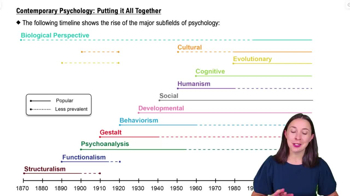Table of contents
- 1. Introduction to Psychology1h 43m
- 2. Psychology Research2h 20m
- 3. Biological Psychology2h 41m
- 4. Sensation and Perception28m
- 5. Consciousness and Sleep32m
- 6. Learning41m
- 7. Memory34m
- 8. Cognition37m
- 9. Emotion and Motivation35m
- 10. Developmental Psychology33m
- 11. Personality48m
- 12. Social Psychology41m
- 13. Stress and Health41m
- 14. Psychological Disorders44m
- 15. Treatment47m
1. Introduction to Psychology
Contemporary Psychology: Putting it All Together
Struggling with Psychology?
Join thousands of students who trust us to help them ace their exams!Watch the first videoMultiple Choice
When Rashid graduated from college, he believed he had finally achieved his full potential. Abraham Maslow called this type of achievement
A
delusion.
B
personal responsibility.
C
self-actualization.
D
self-aggrandizement.
 Verified step by step guidance
Verified step by step guidance1
Understand the context: Rashid believes he has achieved his full potential after graduating from college.
Identify the key concept: The question is about a psychological term related to achieving one's full potential.
Recall Maslow's Hierarchy of Needs: This is a psychological theory that outlines a five-tier model of human needs, often depicted as hierarchical levels within a pyramid.
Focus on the top level of Maslow's pyramid: The highest level is 'self-actualization,' which refers to the realization of one's potential and the development of one's abilities and appreciation for life.
Connect the concept to the scenario: Rashid's belief in achieving his full potential aligns with the concept of self-actualization, as defined by Maslow.

 4:54m
4:54mWatch next
Master Contemporary Psychology with a bite sized video explanation from Hannah Gordils
Start learningRelated Videos
Related Practice




















